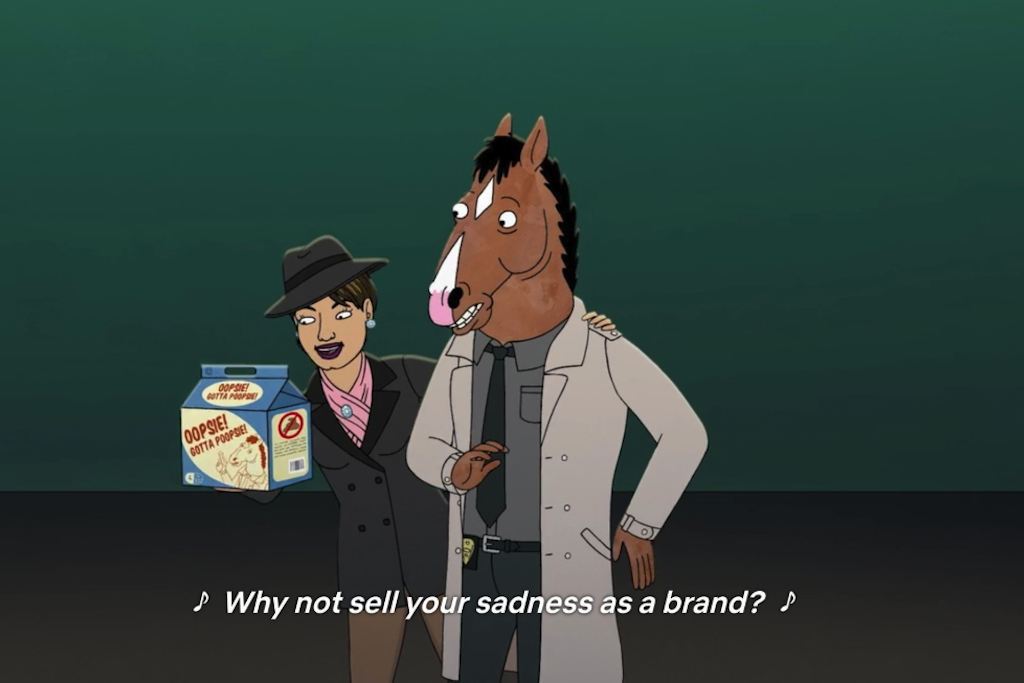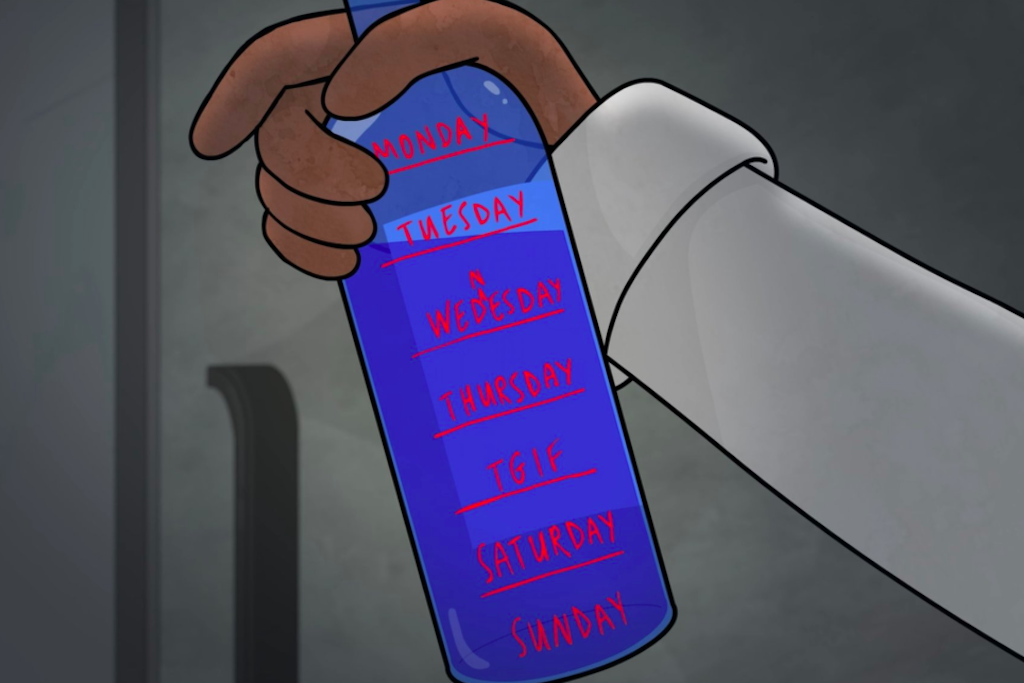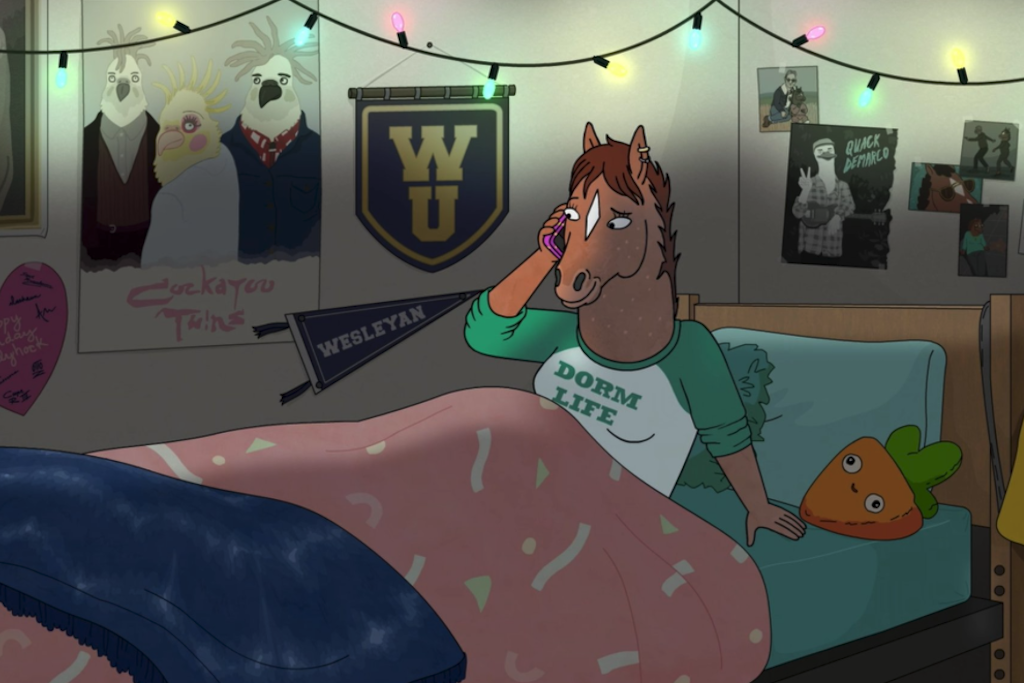‘BoJack Horseman’ Tackles Prestige TV’s Biggest Problem: The Troubled Man
'BoJack Horseman' Is One Of The Few Shows Actually Reckoning With #MeToo

Welcome to ‘Should You Bother Watching’, Junkee’s column which helps to answer the streaming-age’s biggest question: is this show for me? In this one, we tackle BoJack Horseman Season 5.
When BoJack Horseman‘s creator Raphael Bob-Waksberg spoke to Junkee last year, he joked that the Netflix show’s anthropomorphic animation was a way to get around making another show about a sad white guy. While the show’s unmistakably more than just that, much like with BoJack‘s most emotionally eviscerating moments, there’s a sharp shard of truth within the punchline.
At its core, BoJack Horseman is embattled with one of the well-worn trope of prestige TV: the troubled man. Its titular character, voiced by Will Arnett, is a washed-up actor who lives more than comfortably in his ‘Hollywoo Hills’ mansion on residuals from ’90s sitcom Horsin’ Around.
Across its first three seasons, BoJack stumbles between a series of substance-abuse related fuckups — but thanks to a ‘tell-all’ memoir, he rebrands as the Troubled Actor who takes meaty, meta roles, which shields him from most consequence.
But that’s not why the show is so loved online. BoJack Horseman trades in the ridiculous and serves us societal ridicule. For whatever dark depths BoJack and co. reach, the show’s buoyed by illustrator Lisa Hanawalt’s funhouse Hollwoo, a world filled with visual gags, pop-culture puns and absurd storylines featuring clown dentists, an ant queen voiced by RuPaul and a surly Jessica Biel, voiced by Jessica Biel.
Still, its through-line is much more sobering: ultimately, it’s a show about how people inevitably (and unavoidably) pay forward their own interpersonal pains. Of course, the risk is that the show’s emotional cycle invariably ends up rewarding BoJack’s bad behaviour: by continually asking us to empathise with someone who spirals with self-pity, aren’t we just indulging it?

BoJack Horseman Season 5 E11. (Image credit: Netflix)
Thankfully, just as things were getting a little repetitive, Season 4 broke the trend. Exploring BoJack’s family history, the show stretched out to further explain, but not forgive, his actions. At its end, BoJack connected with his illegitimate sister, Hollyhock, an optimistic note that signalled some form of growth. But where to from there?
At five seasons, a TV show has a tough decision: it’s either business as usual at the risk of becoming boring, or evolve at the risk of losing its original spark. Watching BoJack Horseman Season 5, it’s obvious that Bob-Waksberg thought long and hard about where to take the show.
Season 5 addresses the (metaphorical) elephant in the room: does the show need BoJack to be broken so BoJack can stay good, and if so, for how long can a show stay uncorrupted by its core? Here are the pros and the cons to deciding whether to stick through another season.
— Monique Myintoo (@aumonique_) September 16, 2018
PROS
BoJack Addresses Its Own Demons (And Hollywoo’s Too)
This season, BoJack films ‘Philbert’, the pseudo-cerebral detective procedural that his agent Princess Carolyn (Amy Sedaris) forged his signature on to ensure she’d get to produce it.
It’s yet another meta role, but one BoJack’s trying to shy away from.
With Hollyhock in his life (though interstate, at college), we see he’s trying to moderate his drinking, be a better person. “[Philbert’s] a drunk, he’ s an asshole, I don’t want to be… him,” he tells PC. Arnett’s gravelly, desolate line delivery is so cutting, it’s unclear if BoJack is aware how much of himself he’s revealing.

BoJack Horseman’s vodka, S5E1. (Image credit: Netflix)
Of course, BoJack isn’t helped by the fact Philbert’s set looks exactly like his own home: before long, the boundaries are blurred in a substance-assisted sanity spiral. At Season 5, it’s become predictable to the point we’d say its not even a spoiler, but there’s no relish in watching things play out — with BoJack trying more than ever before to fight his addictions, it’s heartbreaking to watch him succumb.
At the same time, the show is unforgiving. In Season 2, BoJack comes close to sleeping with a 16-year-old girl: three seasons later, he wrestles with the part of himself that was willing to abuse a child. Where last season literally dived into BoJack’s consciousness for an episode, this season makes it clear we’ve already done that. The show’s tired of empathy without action: we all are.
Whether latent or pointed, it’s part of a larger post #MeToo tone shift. Just as Louis C.K. announces comeback shows, BoJack drops an episode where a Troubled Actor makes a successful return post-sexual assault scandal by landing a spot on Philbert as a Troubled Man. Sound familiar?
But BoJack ends up being an accidental feminist hero when he says on TV that men shouldn’t sexually assault women: as Diane notes, “the bar for men is depressingly low. Just sprinkle in a few words like ‘intersectionality’ or ‘micro-aggressions’ and VICE News will name you Feminist Of The Year.”
When a talk show audience begin to ‘chant’, “Hollywoo shouldn’t legitimise abusers by allowing them to star in movies and TV shows that play off their problematic personas!”, BoJack nods — as if he’s not just a few steps ahead of the curve.
The show’s never been shy of sardonics, and as our protagonist slides into old habits, it hammers Hollywoo for actively encouraging despicable behaviour. With little accountability (and worse yet, with reward), there’s no reason for BoJack to be better.
Integrally, this season doesn’t apologise for him, instead pointing towards a structural change that goes beyond targeting one figure, one who, at the moment, can always rebrand in a year by saying ‘feminism is bae’. It also questions its own role in that structure, considering whether Philbert’s (and, by extension, itself) ‘examination’ of broken men is in effect normalising it, romanticising toxic behaviour into tragic flaws.
In one obliterating scene, BoJack compares life’s irresolution to a sitcom, saying “you never get a happy ending, because there’s always more show — until I guess there isn’t.” For the first time, the show seems to be building towards its end. It’s unclear what exactly that looks like, but we see the cogs are beginning to turn.
It’s As Heartbreaking As Ever
Despite what he might think at times, BoJack doesn’t have ownership over sadness — this season, thanks to a bevy of bottle or structurally experimental episodes, almost every main character gets a fleshed-out arc.
While Philbert chugs along, PC attempts to adopt a child after her miscarriage last season; Todd (Aaron Paul) explores the romantic contours of his newly defined asexuality, and Diane (Allison Brie) re-examines her life post-Mr. Peanutbutter (Paul F. Tompkins), who in turn is realising he’s not as golden as his coat suggests.

Your favourite comedy, S5E2. (Image: Netflix)
It’s become a bit of a catch-cry to refer to Season 3’s mostly dialogue-free Underwater Episode as the moment BoJack Horseman elevated itself into something more, as if animated series still need to prove themselves and haven’t been quietly destabilising viewers for decades. But the show’s stand-alone episodes are a chrysalis of the show’s capacity for both character study and experimentation.
We won’t spoil too much, but there are a few standouts. In one, Diane’s on-a-whim journey to Vietnam explores her disconnect to her heritage (something no doubt not helped by her voice actor being Allison Brie, an issue Bob-Waksberg recently addressed).
In another, we see BoJack’s Halloween party across the decades, as Mr. Peanutbutter brings his new (young) date; in another, two secondary characters narrate BoJack and co’s antics from afar. Still, it’s a monologue episode by BoJack that’ll have everyone talking, though struggling to say much — it’s a beautiful ramble, one which washes over you.
…But Don’t Worry, It’s Still Incredibly Stupid

Quack DeMarco, S5E1. (Image: Netflix)
BoJack Horseman never forgets its irreverence, even in the most sobering moments. The jokes are best kept a secret, but this season features an out-of-control sex robot, heirloom lube, throwaway lines to Alden Ehrenreich and Ansel Elgort, character puns like Quack DeMarco and one Laura Linney appearance that this gay man couldn’t quite deal with
Jokes remain incredibly specific and referential, and fans have already started sharing screenshots of their favourite visual gags on Twitter. It’s a densely layered show — and, as with past seasons, there’s always one niche joke that feels like it was written specifically for you.
CONS
It’s So Depressing
As you’d know by now, BoJack Horseman is a pretty affecting watch. We’re not even sure this is strictly a criticism, but it’s definitely can be a con: it’s the sort of show that can really carve away at you. Sometimes that’s exactly what you need; sometimes, it’s best to hold off for a week or two.
Oh THERE’S that casual devastation that accompanies episodes of BoJack
— mat whitehead (@matwhi) September 17, 2018
So, Is BoJack Horseman Season 5 Worth Watching?
BoJack Horseman‘s fifth season might be its best, a careful balance of its many cogs. As sharp and sad as ever, the show has pushed itself into new territory through more experimental episodes and a careful, meta-examination of accountability in a post #MeToo world.
While most of 2018’s shows have limpidly referenced sexual assault scandals in wake of saying something, BoJack asks what comes next — it doesn’t have an answer, necessarily, but neither does Hollywoo.
—
BoJack Horseman season five is now streaming on Netflix.
Jared Richards is a staff writer for Junkee, and got full body shivers at the end of BoJack S5E2. Follow him on Twitter.


